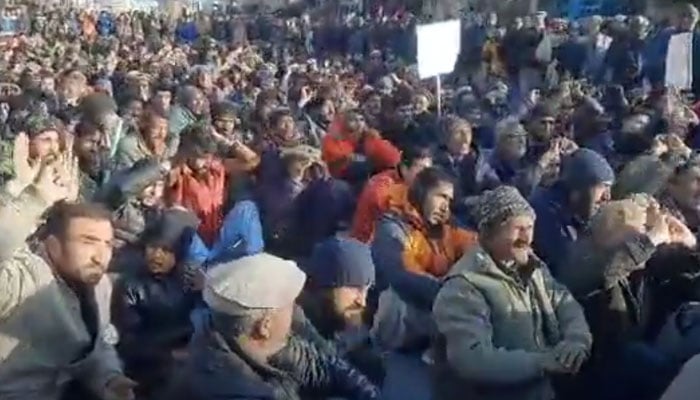Hundreds protest power outages in Gilgit-Baltistan
People in region usually rely on wood to keep warm as both gas and fuel-operated generators are too expensive
KHAPLU: Hundreds of people blocked a highway on Tuesday in in protest against power outages lasting longer than 20 hours, as temperatures plunged to minus 15 degrees Celsius.
Routine load-shedding is widespread across fuel-deprived Pakistan, but residents of the mountainous, snow-covered regions in Gilgit-Baltistan endure prolonged blackouts. “We have been facing the worst kind of power cuts, we get only one or two hours of electricity during the whole day,” Baba Jan, a political activist who organised the protest, told AFP.
Around 1,000 people have joined the demonstration in the picturesque valley of Hunza since Friday, blocking a section of the 1,300-kilometre Karakoram Highway and preventing dozens of freight trucks from crossing into China. People in the region usually rely on wood to keep warm as both gas and fuel-operated generators are too expensive.
“People from all walks of life including the tourists are suffering in extremely cold weather due to the absence of electricity,” Zahoor Ali, another protest organiser told AFP. The highway is part of the China-Pakistan Economic Corridor (CPEC) in which China has invested billions of dollars, connecting the northern border to the southern coastal city of Gwadar.
“The Karakoram Highway at Ali Abad in Hunza is completely blocked for traffic... business between Pakistan and China is suspended for days owing to the blockade,” local trader Javaid Hussain said. “For the smooth running of business between Pakistan and China, the government should take steps to end the power crisis in the region.”
Pressure on the electricity grid increases during peak winter and summer seasons, leading to planned load-shedding as the government grapples with an energy supply crisis, exacerbated by political instability and economic stagnation.
Owing to its remoteness, Gilgit-Baltistan is not connected to the national grid and fails to generate enough power from dozens of hydro plants while thermal plants have proven costly.
Kamal Khan, a senior government official in the region, told AFP by phone that negotiations were ongoing with the protesters, who have demanded that under-construction power projects be expedited and thermal generator plants activated. “Their demands are genuine and we agreed to fulfil all of their demands except the running of thermal generators... because they are very expensive,” he said.
-
 What You Need To Know About Ischemic Stroke
What You Need To Know About Ischemic Stroke -
 Shocking Reason Behind Type 2 Diabetes Revealed By Scientists
Shocking Reason Behind Type 2 Diabetes Revealed By Scientists -
 SpaceX Cleared For NASA Crew-12 Launch After Falcon 9 Review
SpaceX Cleared For NASA Crew-12 Launch After Falcon 9 Review -
 Meghan Markle Gives Old Hollywood Vibes In New Photos At Glitzy Event
Meghan Markle Gives Old Hollywood Vibes In New Photos At Glitzy Event -
 Simple 'finger Test' Unveils Lung Cancer Diagnosis
Simple 'finger Test' Unveils Lung Cancer Diagnosis -
 Groundbreaking Treatment For Sepsis Emerges In New Study
Groundbreaking Treatment For Sepsis Emerges In New Study -
 Roblox Blocked In Egypt Sparks Debate Over Child Safety And Digital Access
Roblox Blocked In Egypt Sparks Debate Over Child Safety And Digital Access -
 Savannah Guthrie Addresses Ransom Demands Made By Her Mother Nancy's Kidnappers
Savannah Guthrie Addresses Ransom Demands Made By Her Mother Nancy's Kidnappers -
 OpenAI Reportedly Working On AI-powered Earbuds As First Hardware Product
OpenAI Reportedly Working On AI-powered Earbuds As First Hardware Product -
 Andrew, Sarah Ferguson Refuse King Charles Request: 'Raising Eyebrows Inside Palace'
Andrew, Sarah Ferguson Refuse King Charles Request: 'Raising Eyebrows Inside Palace' -
 Adam Sandler Reveals How Tom Cruise Introduced Him To Paul Thomas Anderson
Adam Sandler Reveals How Tom Cruise Introduced Him To Paul Thomas Anderson -
 Washington Post CEO William Lewis Resigns After Sweeping Layoffs
Washington Post CEO William Lewis Resigns After Sweeping Layoffs -
 North Korea To Hold 9th Workers’ Party Congress In Late February
North Korea To Hold 9th Workers’ Party Congress In Late February -
 All You Need To Know Guide To Rosacea
All You Need To Know Guide To Rosacea -
 Princess Diana's Brother 'handed Over' Althorp House To Marion And Her Family
Princess Diana's Brother 'handed Over' Althorp House To Marion And Her Family -
 Trump Mobile T1 Phone Resurfaces With New Specs, Higher Price
Trump Mobile T1 Phone Resurfaces With New Specs, Higher Price




